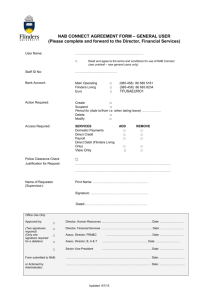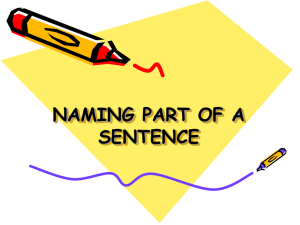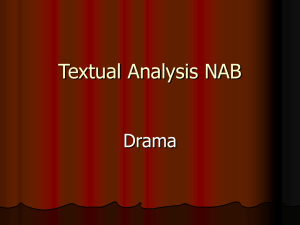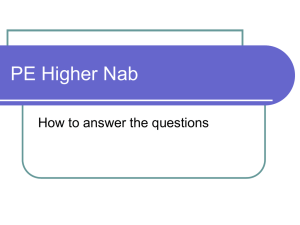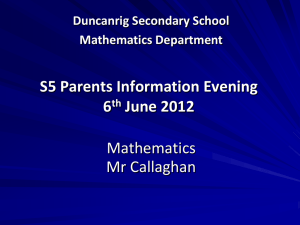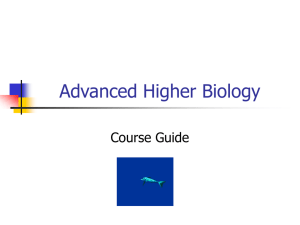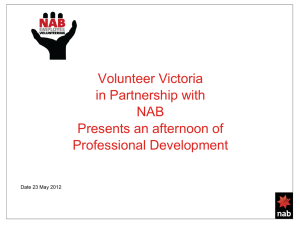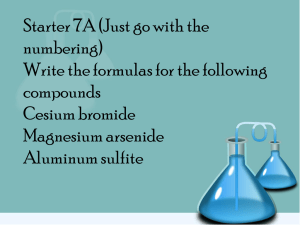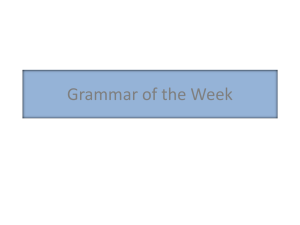NAB Naming Test - Pate Rehabilitation
advertisement
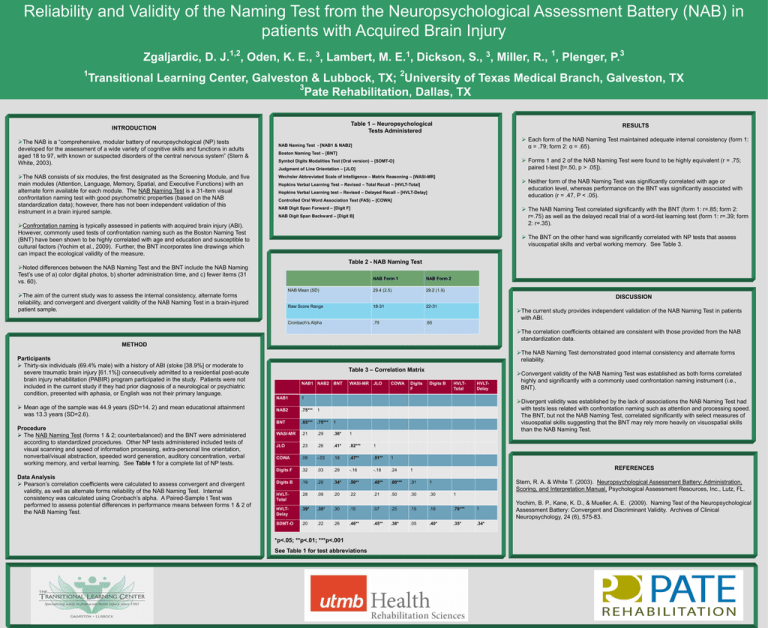
Reliability and Validity of the Naming Test from the Neuropsychological Assessment Battery (NAB) in patients with Acquired Brain Injury 1,2 3 1 3 1 Zgaljardic, D. J. , Oden, K. E., , Lambert, M. E. , Dickson, S., , Miller, R., , Plenger, P. 1 3 2 Transitional Learning Center, Galveston & Lubbock, TX; University of Texas Medical Branch, Galveston, TX 3 Pate Rehabilitation, Dallas, TX Table 1 – Neuropsychological Tests Administered INTRODUCTION The NAB is a “comprehensive, modular battery of neuropsychological (NP) tests developed for the assessment of a wide variety of cognitive skills and functions in adults aged 18 to 97, with known or suspected disorders of the central nervous system” (Stern & White, 2003). RESULTS Each form of the NAB Naming Test maintained adequate internal consistency (form 1: α = .79; form 2: α = .65). NAB Naming Test - [NAB1 & NAB2] Boston Naming Test – [BNT] Forms 1 and 2 of the NAB Naming Test were found to be highly equivalent (r = .75; paired t-test [t=.50, p > .05]). Symbol Digits Modalities Test (Oral version) – [SDMT-O] Judgment of Line Orientation – [JLO] The NAB consists of six modules, the first designated as the Screening Module, and five main modules (Attention, Language, Memory, Spatial, and Executive Functions) with an alternate form available for each module. The NAB Naming Test is a 31-item visual confrontation naming test with good psychometric properties (based on the NAB standardization data); however, there has not been independent validation of this instrument in a brain injured sample. Wechsler Abbreviated Scale of Intelligence – Matrix Reasoning – [WASI-MR] Neither form of the NAB Naming Test was significantly correlated with age or education level, whereas performance on the BNT was significantly associated with education (r = .47, P < .05). Hopkins Verbal Learning Test – Revised – Total Recall – [HVLT-Total] Hopkins Verbal Learning test – Revised – Delayed Recall – [HVLT-Delay] Controlled Oral Word Association Test (FAS) – [COWA] NAB Digit Span Forward – [Digit F] The NAB Naming Test correlated significantly with the BNT (form 1: r=.85; form 2: r=.75) as well as the delayed recall trial of a word-list learning test (form 1: r=.39; form 2: r=.35). NAB Digit Span Backward – [Digit B] Confrontation naming is typically assessed in patients with acquired brain injury (ABI). However, commonly used tests of confrontation naming such as the Boston Naming Test (BNT) have been shown to be highly correlated with age and education and susceptible to cultural factors (Yochim et al., 2009). Further, the BNT incorporates line drawings which can impact the ecological validity of the measure. The BNT on the other hand was significantly correlated with NP tests that assess visuospatial skills and verbal working memory. See Table 3. Table 2 - NAB Naming Test Noted differences between the NAB Naming Test and the BNT include the NAB Naming Test’s use of a) color digital photos, b) shorter administration time, and c) fewer items (31 vs. 60). NAB Mean (SD) The aim of the current study was to assess the internal consistency, alternate forms reliability, and convergent and divergent validity of the NAB Naming Test in a brain-injured patient sample. NAB Form 1 NAB Form 2 29.4 (2.5) 29.2 (1.9) DISCUSSION Raw Score Range 18-31 22-31 Cronbach’s Alpha .79 .65 The current study provides independent validation of the NAB Naming Test in patients with ABI. The correlation coefficients obtained are consistent with those provided from the NAB standardization data. METHOD Participants Thirty-six individuals (69.4% male) with a history of ABI (stoke [38.9%] or moderate to severe traumatic brain injury [61.1%]) consecutively admitted to a residential post-acute brain injury rehabilitation (PABIR) program participated in the study. Patients were not included in the current study if they had prior diagnosis of a neurological or psychiatric condition, presented with aphasia, or English was not their primary language. Mean age of the sample was 44.9 years (SD=14. 2) and mean educational attainment was 13.3 years (SD=2.6). Procedure The NAB Naming Test (forms 1 & 2; counterbalanced) and the BNT were administered according to standardized procedures. Other NP tests administered included tests of visual scanning and speed of information processing, extra-personal line orientation, nonverbal/visual abstraction, speeded word generation, auditory concentration, verbal working memory, and verbal learning. See Table 1 for a complete list of NP tests. Data Analysis Pearson’s correlation coefficients were calculated to assess convergent and divergent validity, as well as alternate forms reliability of the NAB Naming Test. Internal consistency was calculated using Cronbach’s alpha. A Paired-Sample t Test was performed to assess potential differences in performance means between forms 1 & 2 of the NAB Naming Test. The NAB Naming Test demonstrated good internal consistency and alternate forms reliability. Table 3 – Correlation Matrix NAB1 NAB2 BNT WASI-MR JLO COWA Digits F Digits B HVLTTotal HVLTDelay NAB1 1 NAB2 .75*** 1 BNT .85*** .75*** 1 WASI-MR .21 .29 .36* 1 JLO .23 .26 .41* .82*** 1 COWA .08 -.03 .18 .47** .51** 1 Digits F .32 .03 .29 -.16 -.18 .24 1 Digits B .19 .26 .34* .50** .45** .60*** .31 1 HVLTTotal .28 .09 .20 .22 .21 .50 .30 .30 HVLTDelay .39* .35* .30 .15 .07 .25 .15 .19 .79*** 1 SDMT-O .20 .22 .26 .46** .45** .38* .05 .40* .35* .34* *p<.05; **p<.01; ***p<.001 See Table 1 for test abbreviations Convergent validity of the NAB Naming Test was established as both forms correlated highly and significantly with a commonly used confrontation naming instrument (i.e., BNT). Divergent validity was established by the lack of associations the NAB Naming Test had with tests less related with confrontation naming such as attention and processing speed. The BNT, but not the NAB Naming Test, correlated significantly with select measures of visuospatial skills suggesting that the BNT may rely more heavily on visuospatial skills than the NAB Naming Test. REFERENCES Stern, R. A. & White T. (2003). Neuropsychological Assessment Battery: Administration, Scoring, and Interpretation Manual, Psychological Assessment Resources, Inc., Lutz, FL. 1 Yochim, B. P., Kane, K. D., & Mueller, A. E. (2009). Naming Test of the Neuropsychological Assessment Battery: Convergent and Discriminant Validity. Archives of Clinical Neuropsychology, 24 (6), 575-83.

